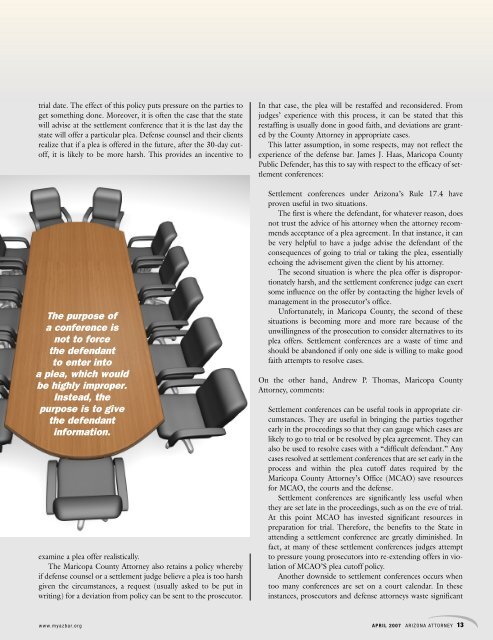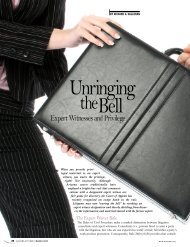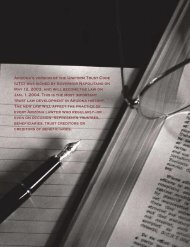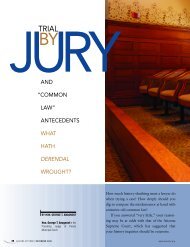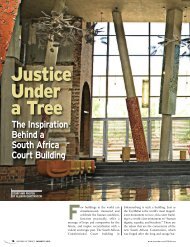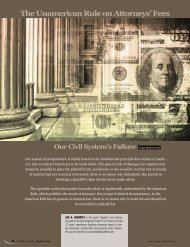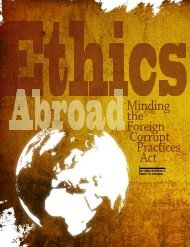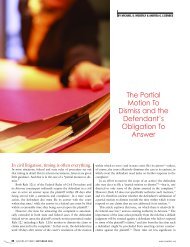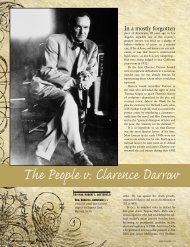<strong>Settlement</strong> <strong>Conferences</strong> <strong>in</strong> Crim<strong>in</strong>al <strong>Court</strong>court reporter is present for all discussions,judges are not usually on thebench. Rather, they sit at a tablewith the defendant, his or her counsel,and the prosecutor or stand <strong>in</strong>front of the table us<strong>in</strong>g a flip chart. Somejudges prefer to meet with both counsel first <strong>in</strong> chambers toestablish ground rules and to get a better grasp of the case. Somewould rather hold the settlement conference itself <strong>in</strong> chambers orthe jury room rather than the courtroom.Those judges who use a chart have written on it <strong>in</strong> advance ofthe conference the charges, the sentenc<strong>in</strong>g ranges if convicted,prior convictions and any plea offer (if known prior to the conference).In that regard, some judges require one or both attorneysto file a settlement memorandum prior to the conference,whereas others do not. The plea offer will be written on the chartand reviewed with the defendant dur<strong>in</strong>g the conference, whichusually last 30 to 45 m<strong>in</strong>utes.Impart<strong>in</strong>g Information/State’s Evidence/State’s OfferThe judge expla<strong>in</strong>s that the purpose of a settlement conference isthreefold:1. to give <strong>in</strong>formation to the defendant about what he or she ischarged with and the sentenc<strong>in</strong>g range of each charge,should the jury determ<strong>in</strong>e the defendant is guilty beyond areasonable doubt of any charge;2. to advise defendant of the evidence the state will <strong>in</strong>troduceat the trial. Typically, the judge asks the prosecutor to dothis, as the judge is usually not that familiar with the case;and3. to exam<strong>in</strong>e the plea offered by the state, its pros and consand ramifications to the defendant, contrast<strong>in</strong>g it to the sentenc<strong>in</strong>grange of the charge if there is no plea and he isfound guilty by a jury.Absence of Coercion/Jury Role/Statistics<strong>Settlement</strong> judges stress to the defendant that the purpose of aconference is not to force the defendant to enter <strong>in</strong>to a plea,which would be highly improper. Instead, the purpose is to givethe defendant <strong>in</strong>formation. Given that fact, he or she will not betold anyth<strong>in</strong>g different than what their counsel has undoubtedlytold them. The judge also <strong>in</strong>dicates to the defendant that:• Defendant has an absolute right to a trial, but that this is achance to talk to a judge who has no stake <strong>in</strong> their case.• Defendant is free to ask any questions he or she wants.• Both the prosecutor and defense counsel are experienced <strong>in</strong>these types of trials (assum<strong>in</strong>g this is true).• Defendant’s counsel will do all that is required to properlyprotect the rights of the client.• Jurors are highly sophisticated, usually very fair and reasonable.• A jury is <strong>in</strong>structed that if it is “firmly conv<strong>in</strong>ced” 6 that adefendant is guilty of a particular charge beyond a reasonabledoubt, it has a duty to convict. If not, the jury has aduty to acquit (some judges will discuss what happens at thetrial and trial procedure).• Of 10 <strong>in</strong>dividuals who appear before asettlement judge, one to four will enter<strong>in</strong>to pleas that day or set a date beforethe settlement judge or the trial judge totake the plea.• An additional one to four will enter <strong>in</strong>topleas later <strong>in</strong> the process, often as a resultof the settlement conference.• One to two proceed to trial. 7Judges advise the defendant that they arethere to answer any questions that the defendantmay have. Some judges will, if asked,give their op<strong>in</strong>ion whether it is a tough case todefend.A judge’s typical statement is that thoughdefense counsel are committed to protect<strong>in</strong>gdefendant’s rights, they are not magicians andmay not get the result the defendant wouldlike, if <strong>in</strong> a given case the evidence is overwhelm<strong>in</strong>g.Usually, judges will discuss withdefendants who have priors whether theircredibility can be impeached if they take thestand.Why Do <strong>Settlement</strong><strong>Conferences</strong>The use of settlement conferences has grownover the years.In 1999 when the Supreme <strong>Court</strong> adopteda permanent procedure govern<strong>in</strong>g theiruse, the Maricopa County Superior <strong>Court</strong> wasaverag<strong>in</strong>g 165 conferences a month, 8 whereasthe crim<strong>in</strong>al division averaged 610 monthlysettlement conferences <strong>in</strong> the first n<strong>in</strong>emonths of 2006. <strong>Settlement</strong> rates dur<strong>in</strong>g1997–1999 were between 64 percent and 78percent. 9 Those <strong>in</strong>volved <strong>in</strong> the process—defense lawyers, prosecutors and judges—believe the settlement rates are with<strong>in</strong> that range today, notwithstand<strong>in</strong>gthe <strong>in</strong>creased volume of cases us<strong>in</strong>g the settlementprocess. 10In 2006, the Maricopa County Attorney’s Office <strong>in</strong>stituted apolicy that no further pleas will be offered after 30 days from the12 ARIZONA ATTORNEY APRIL 2007www.myazbar.org
trial date. The effect of this policy puts pressure on the parties toget someth<strong>in</strong>g done. Moreover, it is often the case that the statewill advise at the settlement conference that it is the last day thestate will offer a particular plea. Defense counsel and their clientsrealize that if a plea is offered <strong>in</strong> the future, after the 30-day cutoff,it is likely to be more harsh. This provides an <strong>in</strong>centive toThe purpose ofa conference isnot to forcethe defendantto enter <strong>in</strong>toa plea, which wouldbe highly improper.Instead, thepurpose is to givethe defendant<strong>in</strong>formation.exam<strong>in</strong>e a plea offer realistically.The Maricopa County Attorney also reta<strong>in</strong>s a policy wherebyif defense counsel or a settlement judge believe a plea is too harshgiven the circumstances, a request (usually asked to be put <strong>in</strong>writ<strong>in</strong>g) for a deviation from policy can be sent to the prosecutor.In that case, the plea will be restaffed and reconsidered. Fromjudges’ experience with this process, it can be stated that thisrestaff<strong>in</strong>g is usually done <strong>in</strong> good faith, and deviations are grantedby the County Attorney <strong>in</strong> appropriate cases.This latter assumption, <strong>in</strong> some respects, may not reflect theexperience of the defense bar. James J. Haas, Maricopa CountyPublic Defender, has this to say with respect to the efficacy of settlementconferences:<strong>Settlement</strong> conferences under Arizona’s Rule 17.4 haveproven useful <strong>in</strong> two situations.The first is where the defendant, for whatever reason, doesnot trust the advice of his attorney when the attorney recommendsacceptance of a plea agreement. In that <strong>in</strong>stance, it canbe very helpful to have a judge advise the defendant of theconsequences of go<strong>in</strong>g to trial or tak<strong>in</strong>g the plea, essentiallyecho<strong>in</strong>g the advisement given the client by his attorney.The second situation is where the plea offer is disproportionatelyharsh, and the settlement conference judge can exertsome <strong>in</strong>fluence on the offer by contact<strong>in</strong>g the higher levels ofmanagement <strong>in</strong> the prosecutor’s office.Unfortunately, <strong>in</strong> Maricopa County, the second of thesesituations is becom<strong>in</strong>g more and more rare because of theunwill<strong>in</strong>gness of the prosecution to consider alternatives to itsplea offers. <strong>Settlement</strong> conferences are a waste of time andshould be abandoned if only one side is will<strong>in</strong>g to make goodfaith attempts to resolve cases.On the other hand, Andrew P. Thomas, Maricopa CountyAttorney, comments:<strong>Settlement</strong> conferences can be useful tools <strong>in</strong> appropriate circumstances.They are useful <strong>in</strong> br<strong>in</strong>g<strong>in</strong>g the parties togetherearly <strong>in</strong> the proceed<strong>in</strong>gs so that they can gauge which cases arelikely to go to trial or be resolved by plea agreement. They canalso be used to resolve cases with a “difficult defendant.” Anycases resolved at settlement conferences that are set early <strong>in</strong> theprocess and with<strong>in</strong> the plea cutoff dates required by theMaricopa County Attorney’s Office (MCAO) save resourcesfor MCAO, the courts and the defense.<strong>Settlement</strong> conferences are significantly less useful whenthey are set late <strong>in</strong> the proceed<strong>in</strong>gs, such as on the eve of trial.At this po<strong>in</strong>t MCAO has <strong>in</strong>vested significant resources <strong>in</strong>preparation for trial. Therefore, the benefits to the State <strong>in</strong>attend<strong>in</strong>g a settlement conference are greatly dim<strong>in</strong>ished. Infact, at many of these settlement conferences judges attemptto pressure young prosecutors <strong>in</strong>to re-extend<strong>in</strong>g offers <strong>in</strong> violationof MCAO’S plea cutoff policy.Another downside to settlement conferences occurs whentoo many conferences are set on a court calendar. In these<strong>in</strong>stances, prosecutors and defense attorneys waste significantwww.myazbar.orgAPRIL 2007 ARIZONA ATTORNEY13


